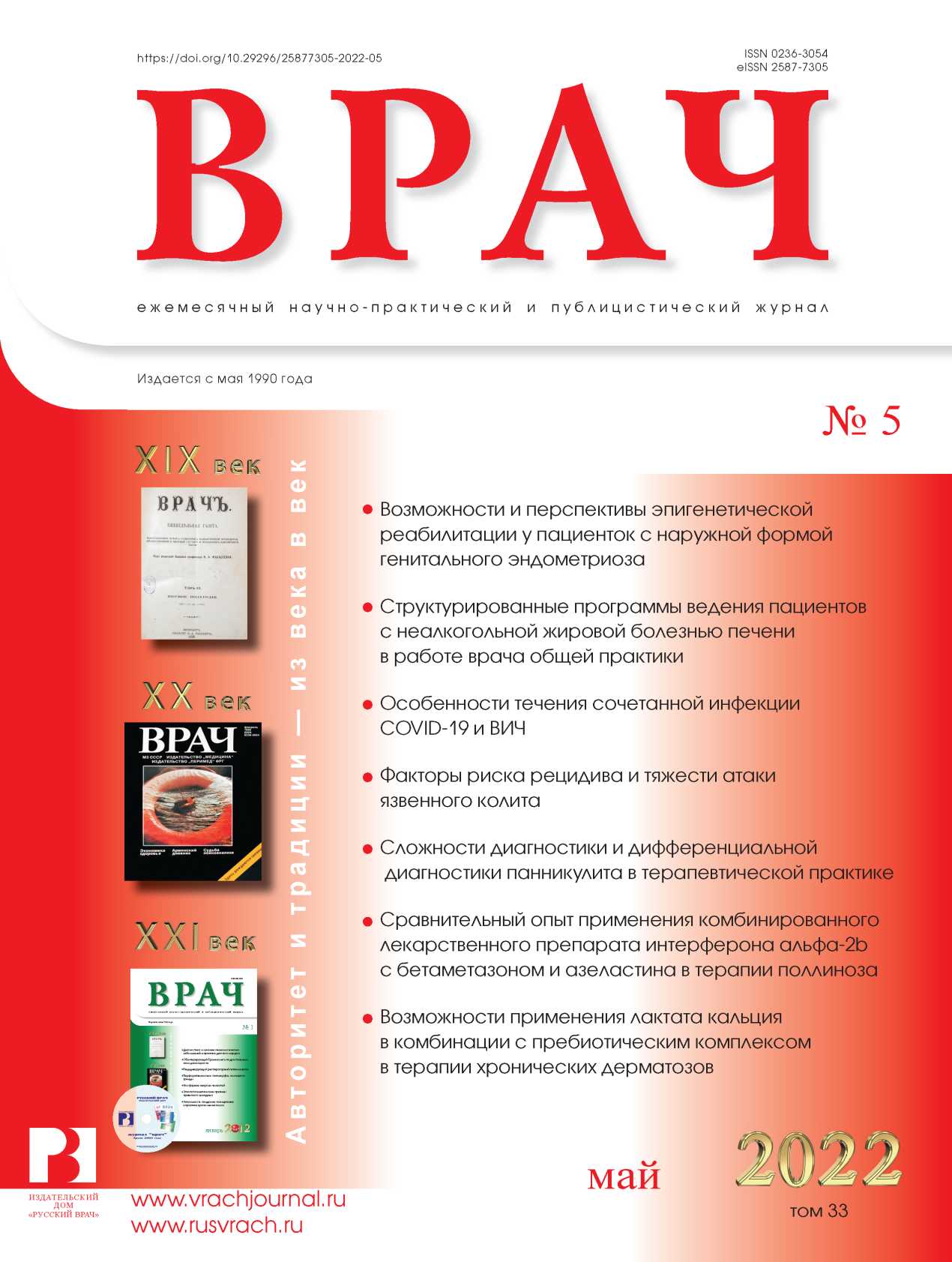Possibilities and prospects of epigenetic rehabilitation in patients with external genital endometriosis
- Authors: Begovich E.1, Solopova A.G1, Khlopkova S.V2, Vlaslna A.Y.1, Kuznetsova V.V1
-
Affiliations:
- I.M. Sechenov First Moscow State Medical University (Sechenov University), Ministry of Health of Russia
- L.A. Vorokhobov City Clinical Hospital Sixty-Seven
- Issue: Vol 33, No 5 (2022)
- Pages: 5-8
- Section: Topical Subject
- URL: https://journals.eco-vector.com/0236-3054/article/view/114611
- DOI: https://doi.org/10.29296/25877305-2022-05-01
- ID: 114611
Cite item
Abstract
Full Text
About the authors
E. Begovich
I.M. Sechenov First Moscow State Medical University (Sechenov University), Ministry of Health of Russia
Author for correspondence.
Email: antoninasolopova@yandex.ru
A. G Solopova
I.M. Sechenov First Moscow State Medical University (Sechenov University), Ministry of Health of Russia
Email: antoninasolopova@yandex.ru
S. V Khlopkova
L.A. Vorokhobov City Clinical Hospital Sixty-Seven
Email: antoninasolopova@yandex.ru
A. Yu Vlaslna
I.M. Sechenov First Moscow State Medical University (Sechenov University), Ministry of Health of Russia
Email: antoninasolopova@yandex.ru
V. V Kuznetsova
I.M. Sechenov First Moscow State Medical University (Sechenov University), Ministry of Health of Russia
Email: antoninasolopova@yandex.ru
References
- Tiffon C. The Impact of Nutrition and Environmental Epigenetics on Human Health and Disease.Int J Mol Sci. 2018; 19 (11): 3425. doi: 10.3390/ijms19113425
- Максименко Л.В. Эпигенетика как доказательная база влияния образа жизни на здоровье и болезни. Профилактическая медицина. 2019; 22 (2): 115-20. DOI: 10.17116/ profmed201922021115
- Дубинская Е.Д., Гаспаров А.С., Колесникова С.Н. и др. Эпигенетика в клинической гинекологии. Вопросы гинекологии, акушерства и перинатологии. 2021; 20 (2): 110-6. doi: 10.20953/1726-1678-2021-2-110-116
- Солопова А.Г., Ачкасов Е.Е., Москвичева В.С. и др. Наружный генитальный эндометриоз: вопросы лечения и реабилитации. Акушерство, Гинекология и Репродукция. 2021; 15 (1): 70-9. doi: 10.17749/2313-7347/ob.gyn.rep.2020.148
- Grimstad F.W., Decherney A.A review of the epigenetic contributions to endometriosis. Clin Obstet Gynecol. 2017; 60 (3): 467-76. doi: 10.1097/GRF.0000000000000298
- Li W.-N., Wu M.-H., Tsai S.-J. Hypoxia and reproductive health: The role of hypoxia in the development and progression of endometriosis. Reproduction. 2021; 161 (1): 19-31. doi: 10.1530/REP-20-0267
- Herreros-Villanueva M., Chen C-C., Tsai E-M. et al. Endometriosis-associated ovarian cancer: What have we learned so far? Clin Chim Acta. 2019; 493: 63-72. DOI: 10.1016/j. cca.2019.02.016
- Petrovic N., Davidovic R., Bajic V. et al. MictoRNA in breast cancer: The association with BRCA1/2. Cancer Biomark. 2017; 19 (2): 119-28. doi: 10.3233/CBM-160319
- Mashayekhi P., Noruzinia M., Zeinali S. et al. Endometriotic mesenchymal stem cells epigenetic pathogenesis: Deregulation of miR-200b, miR-145, and let7b in a functional imbalanced epigenetic disease. Cell J. 2019; 21 (2): 179-85. doi: 10.22074/cellj.2019.5903
- Koninckx P.R., Ussia A., Adamyan L. et al. Pathogenesis of endometriosis: the genetic/ epigenetic theory. Fertil Steril. 2019; 111 (2): 327-40. doi: 10.1016/j.fertnstert.2018.10.013
- Koninckx P.R., Ussia A., Adamyan L. et al. Infection as a potential cofactor in the genetic-epigenetic pathophysiology of endometriosis:a systematic review. Facts Views Vis Obgyn. 2019; 11 (3): 209-16
- Chen C., Song X., Wei W. et al. The microbiota continuum along the female reproductive tract and its relation to uterine-related diseases. Nat Commun. 2017; 8 (1): 875. doi: 10.1038/s41467-017-00901-0
- Esfandiari F., Favaedi R., Heidari-Khoei H. et al. Insight into epigenetics of human endometriosis organoids: DNA methylation analysis of HOX genes and their cofactors. Fertil Steril. 2021; 115 (1): 125-37. doi: 10.1016/j.fertnstert.2020.08.1398
- Lagana A.S., Garzon S., Gotte M. et al. The pathogenesis of endometriosis: Molecular and cell biology insights.Int J Mol Sci. 2019; 20 (22): 5615. doi: 10.3390/ijms20225615
- Каприн А.Д. Онкогинекология: национальное руководство. М.: ГЭОТАР-Медиа, 2019; 384. doi: 10.33029/9704-5329-2-0NR-2019-1-384
- Bulun S.E., Wan Y., Matei D. Epithelial mutations in endometriosis: Link to ovarian cancer. Endocrinology. 2019; 160 (3): 626-38. doi: 10.1210/en.2018-00794
- He J., Chang W., Feng C. et al. Endometriosis malignant transformation: epigenetics as a probable mechanism in ovarian tumorigenesis.Int J Genomics. 2018; 1-13. doi: 10.1155/2018/1465348
- Леваков С.А., Мамедова А.Э., Азадова Г.Я. и др. Уровень экспрессии длинных некодирующих РНК ROR и MALAT1 при эндометриозе. Акушерство и Гинекология. 2021; 5: 141-5. doi: 10.18565/aig.2021.5.141-145
- Бегович Е., Солопова А.Г., Бицадзе В.О. и др. Актуальные вопросы этиопатогенеза, лечения и реабилитации эндометриоз-ассоциированного рака. Акушерство, Гинекология и Репродукция. 2021; 15 (3): 287-94. doi: 10.17749/2313-7347/ob.gyn, rep.2021.206
- Ruegsegger G.N., Grigsby K.B., Kelty T.J. et al. Maternal Western diet age-specifically alters female offspring voluntary physical activity and dopamine-and leptin-related gene expression. FASEB J. 2017; 31 (12): 5371-83. doi: 10.1096/fj.201700389R
- House J.S., Mendez M., Maguire R.L. et al. Periconceptional maternal mediterranean diet is associated with favorable offspring behaviors and altered CpG methylation of imprinted genes. Front Cell Dev Biol. 2018; 6: 107. doi: 10.3389/fcell.2018.00107
- Ek W.E., Tobi E.W., Ahsan M. et al. Tea and coffee consumption in relation to DNA methylation in four European cohorts. Hum Mol Genet. 2017; 26 (16): 3221-31. DOI: 10.1093/ hmg/ddx194
- Tiffon C. Histone deacetylase inhibition restores expression of hypoxia-inducible protein NDRG1 in pancreatic cancer. Pancreas. 2018; 47 (2): 200-7. DOI: 10.1097/ MPA.0000000000000982
- Abdul Q.A., Yu B.P., Chung H.Y. et al. Epigenetic modifications of gene expression by lifestyle and environment. Arch Pharm Res. 2017; 40 (11): 1219-37. doi: 10.1007/s12272- 017-0973-3
- Vesnina A., Prosekov A., Kozlova 0. et al. Genes and eating preferences, their roles in personalized nutrition. Genes (Basel). 2020; 11 (4): 357. doi: 10.3390/genes11040357
- Hardeland R. Melatonin and inflammation-Story of a double-edged blade. J Pineal Res. 2018; 65 (4): 12525. doi: 10.1111/jpi.12525
- Кузнецова И.В. Адъювантная терапия при миоме матки и генитальном эндометриозе. Эффективная фармакотерапия. 2021; 17 (19): 20-30. doi: 10.33978/2307-35862021-17-19-20-30
- Киселев В.И., Муйжнек Е.Л., Ашрафян Л.А. и др. Эпигенетика в гинекологии и онкогинекологии: WIF и реальность. Акушерство и гинекология: Новости. Мнения. Обучения. 2018; 1: 18-26.
- Хашукоева А.З., Хлынова С.А., Ильина И.Ю. и др. Эстрогензависимые состояния женской репродуктивной системы: возможности негормональной терапии с применением индол-3-карбинола. Акушерство и Гинекология. 2020; 5: 65-9. DOI: 10.18565/ aig.2020.5.65-69
Supplementary files






